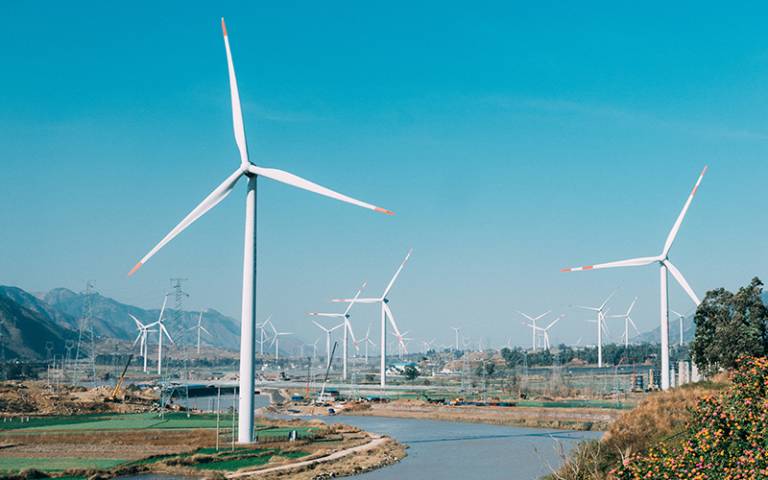
Richard Kirkman
Innovation is an elusive and contradictory beast which emanates from all corners of the earth bringing with it exciting, fresh, solutions to planetary problems. One of the challenging and yet critical areas is in the lifecycle of the broad range of materials we use every day.
We have only just started tapping into the opportunities offered by what we call the “circular economy” and real resource efficiency enabling a sustainable future compared to our consumerist present. Our recent research with Imperial College indicated that the circular economy is worth £30 billion to UK plc.
Green innovation is at the core of Veolia’s growth model. Our capacity to innovate and deploy new solutions at scale makes us the UK leader in environmental services. Green innovation underpins our waste, water and energy management services and helps us to accelerate on the pathway towards the circular economy and preserving raw materials as an environmental service.
Veolia works with many UK industrial partners to deliver these developments. We are helping industry change their processes and organisational practices to improve the way they manage their waste, their water and their energy, and turn waste management from a regulatory obligation into a business opportunity while substantially reducing environmental impact of their activities. We offer advice on how to improve recycling performance, redesign packaging, harmonise collections, and consider alternatives to the use of virgin plastic in light of the proposed tax on not using recyclate feedstocks.
Scalable examples of delivering the circular economy are projects such as our work with the UKs largest glass insulation manufacturer to replace their virgin feedstocks for fully recycled content from UK household recycling. This in turn will cut energy, water, materials and GHG emissions, delivering better price and security and mainstreaming a circular solution at scale. This example goes at the heart of wider impact business can deliver with the right skills, resources and environmental policy.
We are still facing systemic barriers and bottlenecks which hamper both the diffusion of tested solutions and the scaling of new emerging innovations. Although since the 1990s we have had relevant technology and capability at our fingertips to deliver on water treatment, waste management, renewable energy, carbon capture and air quality, we have not seen sufficient transformation in the UK industry. Investment timelines should consider sustainability of the business and regulatory uncertainty needs to be tightened up to free our collaborative hands to deliver the circular economy and unlock the £30b of value.
Government has a key role in creating an enabling environment for green innovation which creates incentives for developing and adopting better practices. We have done it before. The UK has leapt ahead in renewable energy with scope for further future enhancement via battery storage and grid flexibility due to National Grid flexibility contracts - Veolia is central to this activity with a lively £300m energy business and innovative solutions such as batteries and district heating. The circular Economy has become viable largely due to the landfill tax escalator and our renewables success was due to a game changing incentive from the Renewables Obligation. Both were clear and successful signals to the market which delivered a greener UK. They were great examples of government and the public sector driving the green economy.
The Government waste and resources strategy is a recipe for environmental and business success, it consists of 4 core planks, the Extended Producer Responsibility scheme, a Deposit Return Scheme, consistency in recycling collections and a world leading tax for not using recycled content in packaging. After a 10 year hiatus in waste policy, these set of proposals we believe should be implemented regardless of political tenure and which will allow the UK to independently rule the waves of environmental protection.
The Industrial Strategy along with the other strategic initiatives, the Clean Growth Strategy and the Resources and Waste Strategy, together are a step in the right direction.There is a need however to ensure that these strategies provide a ground for concrete instruments creating strong incentives and rewards for companies developing and adopting processes, products and services which create value for the economy, society and for the environment.
The UK policy framework for green innovation should combine ambitious goals with a dose of pragmatism. It needs to support short-term quick wins that unlock investment (e.g. easier access to finance for adoption of resource-efficient technologies and practices) as well as more ambitious longer-term investments in system innovations (e.g. functional substitution of single-use plastic products).
We believe the government and regulators can become a positive force for change by deploying a coherent policy portfolio with several key instruments providing strong incentives to transform business practices such as an ambitious Extended Producer Responsibility (EPR) scheme and a ‘plastics tax’.
The strategy is well set out - it now just needs the courage of its convictions to go through with it and allow us to be the generation that made the world sustainable.
 Close
Close

